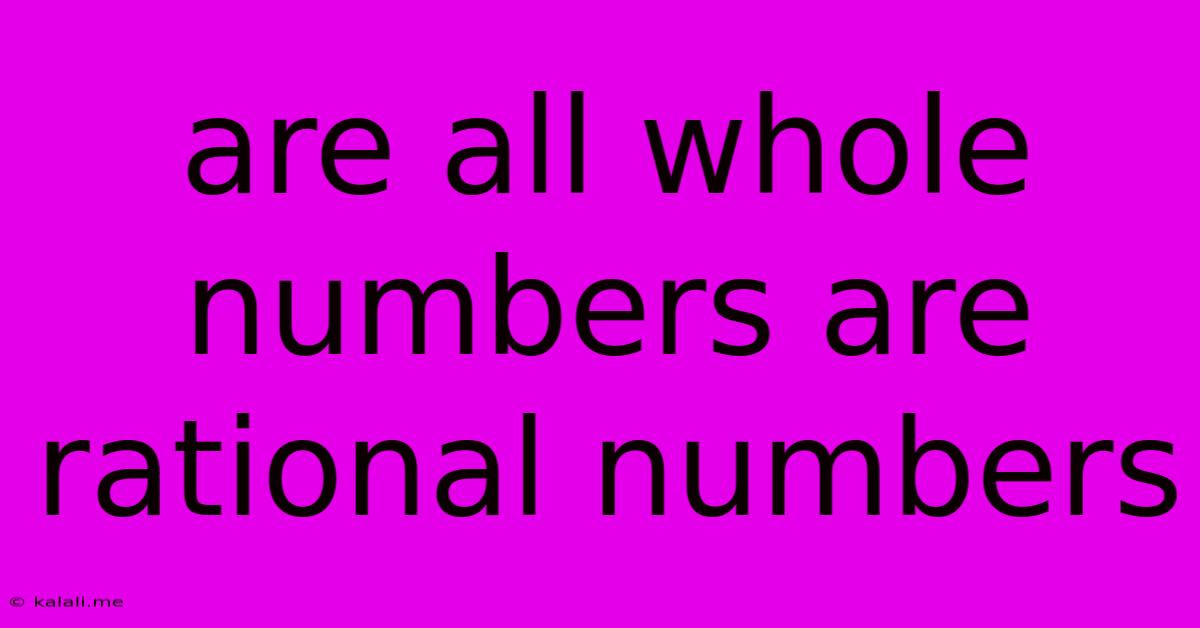Are All Whole Numbers Are Rational Numbers
Kalali
Jun 03, 2025 · 2 min read

Table of Contents
Are All Whole Numbers Rational Numbers? Yes, Here's Why
This article explores the relationship between whole numbers and rational numbers, answering the question: are all whole numbers rational numbers? The short answer is yes. Understanding this requires a brief look at the definitions of each number type. This understanding is crucial for anyone studying mathematics, especially for those preparing for standardized tests or higher-level math courses. Let's dive in.
Understanding Whole Numbers
Whole numbers are the set of non-negative integers: {0, 1, 2, 3, 4, ...}. They represent complete units and don't include fractions or decimals. Think of counting objects – you'd use whole numbers. They form the foundation of many mathematical concepts. Key characteristics of whole numbers include:
- Non-negative: They are always zero or positive.
- Integers: They are whole numbers without fractions or decimals.
- Counting Numbers: They are used for counting and ordering.
Examples include the number of apples in a basket, the number of students in a class, or the year of birth.
Understanding Rational Numbers
Rational numbers are any numbers that can be expressed as a fraction p/q, where 'p' and 'q' are integers, and 'q' is not zero. This is a crucial point: the denominator cannot be zero because division by zero is undefined in mathematics. Rational numbers include:
- Integers: All integers can be written as fractions (e.g., 5 can be written as 5/1).
- Fractions: These are numbers expressed as a ratio of two integers (e.g., 1/2, 3/4, -2/5).
- Terminating Decimals: Decimals that end (e.g., 0.25, 0.75).
- Repeating Decimals: Decimals with a repeating pattern (e.g., 0.333..., 0.142857142857...).
The Connection: Whole Numbers as Rational Numbers
Now, let's connect the two. Every whole number can be expressed as a fraction where the denominator is 1. For example:
- 0 = 0/1
- 1 = 1/1
- 2 = 2/1
- 3 = 3/1
- And so on...
Since all whole numbers fit the definition of a rational number (being expressible as a fraction p/q where q ≠ 0), we can definitively say that all whole numbers are rational numbers. However, the reverse is not true; not all rational numbers are whole numbers. Fractions like 1/2 or -3/4 are rational but not whole numbers.
Further Implications and Conclusion
This understanding of the relationship between whole numbers and rational numbers is fundamental to more advanced mathematical concepts. It helps clarify the hierarchy of number systems, placing whole numbers as a subset within the larger set of rational numbers. Mastering these basic definitions is key to tackling more complex mathematical problems involving fractions, decimals, and other number types. Therefore, understanding that all whole numbers are rational numbers is a crucial building block in your mathematical journey.
Latest Posts
Latest Posts
-
How To Answer Someone Elses Cellphone
Jun 05, 2025
-
Everything Wrong With The Death Star Explosion
Jun 05, 2025
-
How To Check Grounding With Multimeter
Jun 05, 2025
-
Black Or White Is Hot Wire
Jun 05, 2025
-
Mass Effect 3 Where Is Kasumi On Normandy
Jun 05, 2025
Related Post
Thank you for visiting our website which covers about Are All Whole Numbers Are Rational Numbers . We hope the information provided has been useful to you. Feel free to contact us if you have any questions or need further assistance. See you next time and don't miss to bookmark.